Kabul – The Indonesian Family
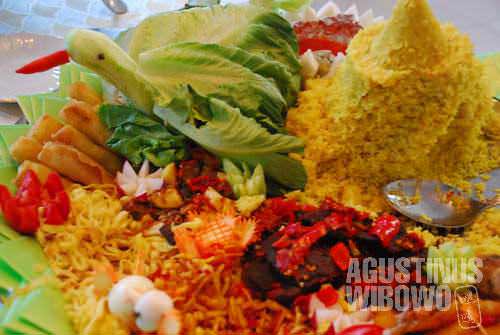
The only place to taste genuine Indonesian food in Afghanistan
‘If you are abroad, remember, embassy is your home,’ said my elementary school teacher, explaining the function of embassy in a moral education class. This, at least in Afghanistan, is proven true. Embassy of the Republic of Indonesia in Shahr-e-Nao Kabul is indeed warm shelters for small Indonesian community in this Islamic Republic.
There are not too many Indonesians in Afghanistan, and for sure less in Kabul. Not more than 30 Indonesians seen regularly in the embassy in the capital, and that already includes the embassy staff. People come and go. This small community always welcomes newcomers with smiles and prepares farewell party (sometimes almost rained by tears) for those who leave. In the last three months of my stay here, already two long-term Indonesians leave the country. For small family like this, the feeling of losing a member always hurts.
The embassy people dominate this little community. Not before December 2006 the Indonesian embassy in Kabul is led by an Ambassador (Duta Besar Luar Biasa dan Berkuasa Penuh – Ambassador Extraordinary and Plenipotentiary…what a title). As anywhere else, the ambassador comes with his wife, head of domestic affairs (Kepala Rumah Tangga), and cooks. The group adds to the five diplomats in charge and some local staff. Among the local staff, there are two Indonesian men who married to Afghan women and have little family in Kabul. Then if you count the family members as part of the Indonesian community, we have around 20 people already. We have also some Afghan nationals who are very much attached to the embassy. One of the embassy drivers speaks very good Indonesian, because he was a refugee in an island in Nusa Tenggara and married to Indonesian woman, both now live in Kabul.
The second group of Indonesians in Kabul is those who work here, mostly in NGOs and United Nation missions. There are not too many actually. Those who are seen quite often roaring the embassy sum up not more than 8 people. Compared to other countries like Nepal and the Philippines who have hundreds of their nationals working in Kabul but none have embassies, the Indonesian embassy is like a luxury in the middle of war-torn land.
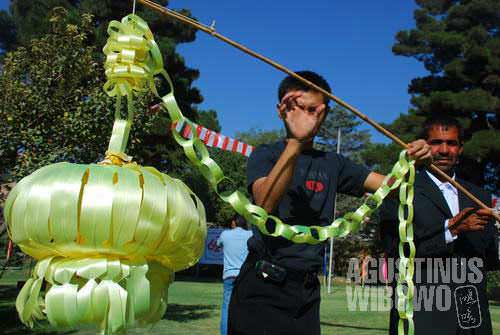
Preparing for the Independence Day
Opening an embassy in war zone is always not easy. The Indonesian embassy used to be a bigger one: one office area in Wazir Akbar Khan and one residential for the ambassador in Shahr-e-Nao. But the Taliban occupation forced the embassy to be ‘non-activated’ and the ambassador at that time went to India, being ambassador to Afghanistan but working from his office in New Delhi. When this ambassador finished his duty, the embassy is accredited to Indonesian embassy in Pakistan.
So what happened to our two buildings in Afghanistan when everybody took exodus to India/Pakistan? The office in Wazir Akbar Khan was on rental basis, and the residential was on 99-year-rental basis. When I visited Afghanistan in 2003, I was informed in Islamabad that Indonesian embassy in Kabul didn’t operate. Nevertheless, I was suggested to register myself to an Indonesian in Kabul, but I didn’t go until I had problem with my Pakistan visa application. At that time, there was only one Indonesian, a local staff. Mr. Kasim, being in Afghanistan for more than a dozen year, said, “What else we can do? We have to be here to keep the asset of our country.” At that time, I was impressed by the beautiful statues, artistic paintings, and bight red carpet in the ambassador residential, which now turned to be ‘embassy’ of Indonesia. Having no ambassador and no diplomat, Mr. Kasim had the authority to issue legal letter branded “Embassy of the Republic of Indonesia – Kabul.” The letter was typed in a dark room full of books and paper, by the help of an old computer typed by an old Afghan secretary. That was my first impression of an Indonesian embassy in war zone: a palace in one side, a shantytown in the other.
Today, Mr. Kasim is the staff of consular affairs of the embassy. He might be the first Indonesian you have to encounter in any visit to the embassy. He, married to an Afghan woman who doesn’t speak Indonesian language, has some cute Afghanized Indonesian offspring. Together with Mr. Kasim, Mr. Epi (corruption from ‘Elvi’ of ‘Elviansyah’) is among the Indonesians who spend most time in Afghanistan. Mr. Epi also married to an Afghan woman, but his wife speaks very good Indonesian language and capable in making delicious Indonesian food. What behind this is that during the wars, Mr. Epi and family spent much time in Pakistan, where his wife learned about Indonesian language and food from the ladies in the Indonesian embassy there. Their three little children are also raised as bilinguals.

Children Dancing …
What makes this embassy different from others in Afghanistan is, despite of the bad security situation which makes people suspicious on each other, Indonesian embassy is still the place that Indonesians may call as home. The homey atmosphere is what we are proud of. It’s not uncommon for Indonesians working in Kabul to spend their long boring weekend nights (that’s on Thursdays and Fridays) playing domino and singing nostalgic songs with the Karaoke machine. People are allowed to come by their initiative, but I have sometimes received calls from the embassy on Thursday night to join the crowd. It’s a much better alternative compared to spending money in Kabul’s luxurious bars designated for Westerners thirst of atmospheric night parties.
It’s very easy to spend hours just singing songs of Obbie Mesakh, Pambers, or even Joshua and Trio Kwek-kwek with the diplomats. Everybody tries their best to get the highest score on the Karaoke machine, which can be fooled in particular cheating methods. The Thursday nights are also known as ‘domino nights’, when the domino lovers play until morning, continued with a fresh bath in Afghan traditional hammam (sauna and massage). And what can be better than delicious Afghan curry (karahi), coffee-mix (’coffee mix da bala’) to accompany the night owls in our embassy? It reminds us to Roma Irama’s song, “Begadang jangan begadang …, kalau tiada karahi begadang boleh saja… asal ada karahi…”
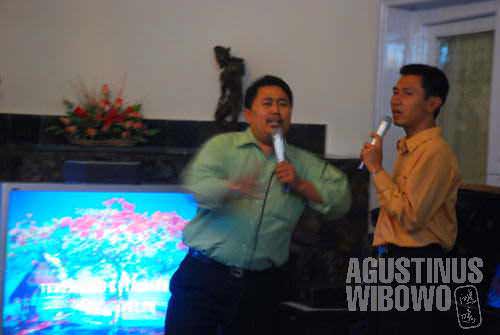
… Fathers Singing
The little community makes a very close relationship between the embassy people and Indonesian ‘civilians’ (what they call as ‘warga’). We often go to the coffee shops together for lunch in weekends. Sometimes I also spend my weekend reading my books on the sofa and take naps there. The last hilarious thing was when the embassy cook made deep fried pigeons and 1-kg of ‘terasi sambal’ chili sauce for a Friday lunch. It is indeed the embassy who helped a lot the desolated Indonesians who have no choice but to survive in the Afghan land.
Several parties are conducted regularly by the embassy. Nowadays are the seasons of Indonesian gatherings, prepared to commemorate the National Day. Some sport events are held since this month, and the winners will be awarded by medals (hopefully gold) on August 17, our Independence Day. Want to know what kind of sport events that we are struggling for? Billiard, tennis, chess, karaoke, and last but not least, domino. I am practicing hard, but as some people joined the Olympic Preparation (’Pelatihan Nasional’), I have lost any chance for any awards (except if they want to hold eating contest). Because of these busy sport events, the embassy becomes a warm gathering place every Friday and Saturday. The respected diplomats have tennis match at the morning, and the Indonesian ladies (wife and relatives of Mr. Epi) prepare the unmatchable ‘bubur kacang ijo’ for a genuine Indonesian breakfast, along with lumpia, martabak, and hot chocolate. The Indonesian embassy tennis court yard is so famous here. Even the Arab ambassador also comes here regularly to match our respected man (maybe revenge to our failed match in the Asian Cup in Jakarta).
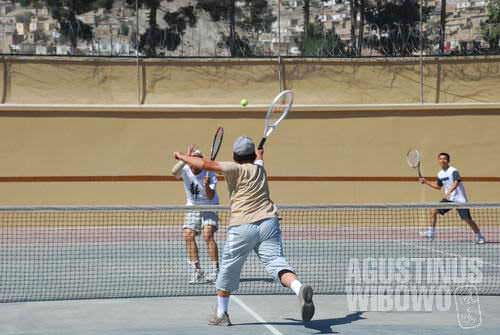
Smash!!!!
For lunch…, you will not believe this. Despite of thousand kilometers separating us from our homeland, we still can enjoy genuine terasi sambal, hot white rice, soto ayam chicken soup, lontong sayur, es campur and es buah cocktail, and many others to stimulate your saliva production. If for me, this gathering is an embassy attempt ‘to promote and guarantee nutrition of Indonesians in Afghanistan’ (the embassy has successfully put so much weight on me that now almost everybody realizes that I am much fatter than before), but an embassy diplomat says, “The most important thing is to gather. When else we can gather like this?” The gatherings, besides giving me good nutrition, also give me big chance to know and befriend with other Indonesians with the same fate: working in the Afghan land.
Maybe nobody knows better than Indonesians about this phrase: compatriots with the same fate and same struggle. And maybe there are no other embassies but the Indonesian one which emphasize this at their service. Starting from last month, we have monthly gathering to celebrate the birthdays (or better, ‘birth month’) of Indonesian residents in Kabul. Last month we had 5 happy people and this month 4.
Nasi kuning (yellow rice) never be absent from the menu of mass birthday party in the embassy. Aini, one of those who celebrate birthday in July, just comes from her UN office after work. She comes late. Food is almost finished due to mass attack from hungry Indonesians (me inside), but it doesn’t make her depressed. Her bright smile enjoying the cocktail and tart cake, continued by Rita-Effendy-quality of voice flowing with Karaoke music, shows that she was happy, extremely.
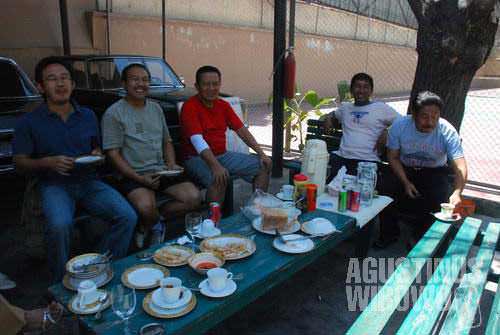
We are family
Another Madam Aini, this one is a wife of an Afghan national, enjoyed gathering in the embassy because of her longing to the homeland. Years passed, and nobody in her family but her Afghan husband can speak Indonesian. But you don’t need to doubt about her love to the homeland. Madam Aini often tells her father-in-law how good Indonesia is, for example, all husbands only have one wife each (but when her Afghan father shows her a TV show about an Indonesian man with 15 wives, she blushed). It’s the embassy where she can get the most up-to-date information of the homeland. Just recently Madam Aini told her old Afghan father that in America people went to demonstrations on the street without wearing clothes. Madam Reny, who just came from Indonesia, says, “Don’t be mistaken. We have the same in Indonesia already. Woman street hawkers, when the police come to rush them, take off their clothes as protest. Even you can see that on TV, news programs.” Madam Aini was shocked, “Oh my God… I can’t let my father-in-law to know about this… otherwise I will be embarrassed!”
No matter it is true or not, gossip and chit chat is genuine Indonesian culture. And embassy is one place for this. New and fresh information, bland dirty jokes, ‘perjuangan’ movies, TV ads jingles and actors quotes (like ‘kembali ke laptop’, etc) are always exchanged when two-or-more Indonesians gather. So don’t be mistaken, Indonesians in Afghanistan are not outdated souls.
If others may grumble that having Indonesian passport means difficult access to other countries because some are reluctant to give visa, I feel proud to have an embassy, probably the unique one, to try hard to offer a safe shelter and family atmosphere for the citizens to pass the bland life in Kabul.






Bagaimana jika afganistan man menikah dengan indonesian woman? Apakah aman?